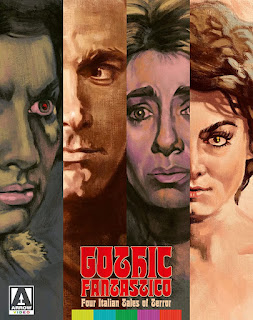Director: Mino Guerrini
Notable Cast:
Franco Nero, Gioia Pascal, Erika Blanc, Olga Solbelli, Marina Morgan, Gara
Granda, Richard Hillock, Luciano Foti
Arrow Video has delivered another one of those classic
box sets they are known for unleashing with their latest: Gothic Fantastico:
Four Italian Tales of Terror. Pulling together four films under a common
thematic and stylistic aspect, this set contains some 1960s cult cinema finds
with brand new 2K restorations, gorgeous packaging, and enough new
commentaries, essays, and interviews to impress any movie collector.
When Franco Nero’s name pops up at the beginning of a film,
it’s hard not to get somewhat excited. Not that he’s always great (or is always
cast in great movies), but he easily brings a kind of pop that can sway the
tides of a film toward the positive.
Yet, despite the relatively strong word of mouth online in
places like Letterboxd, The Third Eye is a substantially mixed
experience - even within the films contained in this Gothic Fantastico
box set. The first act is cheesy melodrama through and through and while the
film does strengthen as it goes, it’s a film that needs a lot of forgiveness to
buy into its style and story. For those willing to give in to its over-the-top
elements, it’s a decent killer thriller with a third act that helps punch
through some of its more mundane scripting aspects.
Although there are certainly gothic elements at play in some
of its choices, particularly with how it toys with the possibility that there
is a fantastical element to its plot for small spats in the second act, The
Third Eye remains much more indebted to its Hitchcockian thriller aspects
than it does to Corman or the Universal horror films from the decades prior.
Mino, played a bit too overzealously by Franco Nero, is caught in a whirlwind
of jealousy when his mother and housekeeper become enraged with his love for
his fiancée, the always solid Erika Blanc. Murders and other conniving events
occur. Soon, Mino begins to lose his own grip on reality which pits him into
a flurry of derangement when his fiancée’s sister, also played by Erika Blanc
arrives at the home.
Naturally, the film bides its time developing the
relationships of the various people around the home for most of its first half.
It’s unfortunately burdened by its melodramatic style of dialogue and the
romantic love “triangle” that develops which feels borderline comedic at times,
despite some solid efforts at establishing a building tension by director Mino
Guerrini. It also doesn’t help that the film is legitimately attempting to take
many of the pieces of Hitchcock’s Psycho and put a sly Italian twist on
them which only works to a limited extent.
Granted, as its various twists and turns are unveiled, the
film does earn some merit for just being odd enough to hook its viewer. Its
biggest obstacle is getting an audience to buy into Mino’s descent into madness
when, let’s be honest, he was a pretty strange duck to begin with. It
helps that Nero and Blanc anchor the film impeccably well simply with their
screen presence. Even the black and white cinematography can’t escape the
piercing eyes of Nero, but he’s occasionally putting a bit too much cheese in
with the rest of the sandwich to find the right balance.
The film stumbles its way into a second half that is
justifiably entertaining, but it’s not a smooth stumble as it tries to find its
own voice in recreating some of the Psycho beats and character
elements. It does, however, have some key moments that stand out. When one
character is left bloodied and stranded for dead in a hallway, Guerrini is
savvy enough to make her plight to reach a phone one that’s an excruciatingly long
and tense journey. It’s a simple sequence made highly effective by its pacing, performance,
and breath-holding tension. If only more of The Third Eye could have
replicated that balance.
Still, for fans of Italian cinema, The Third Eye is
just interesting enough to pull a recommendation. If anything, it’s to see an
early film for both Nero and Blanc more than anything else and the Hitchcockian
riffs are a bit of icing for those looking to see how the film handles its
bolder maneuvers of narrative. It’s full of its own nice old-school thriller
atmosphere, but its troublesome start and melodramatic streaks undermine some
of its better qualities.




No comments:
Post a Comment